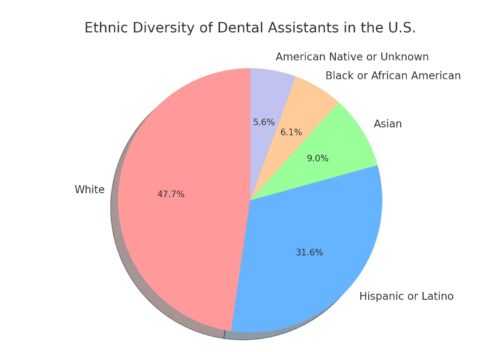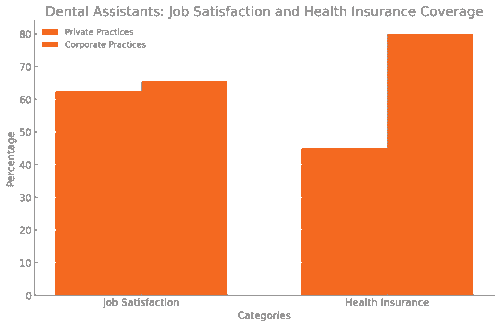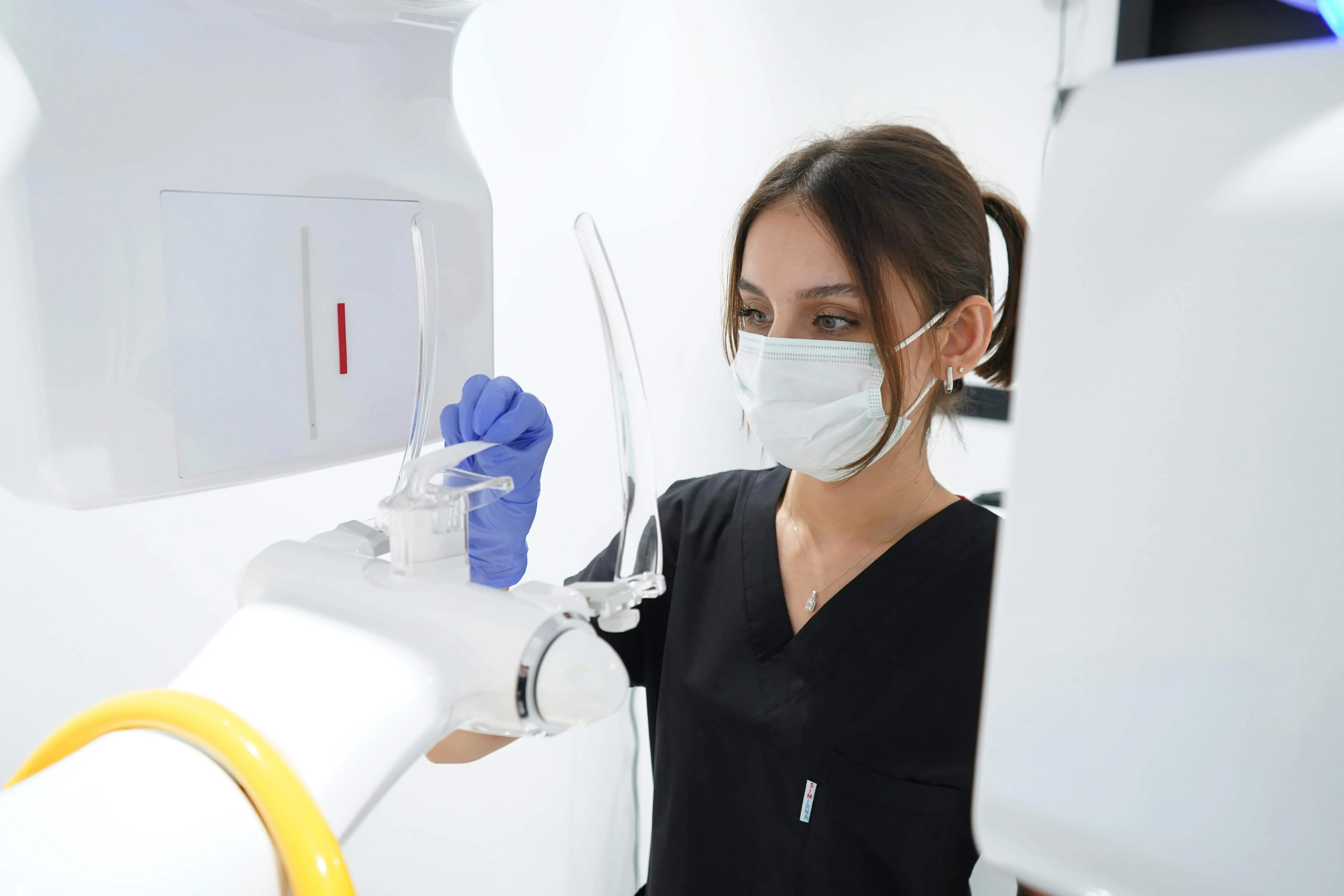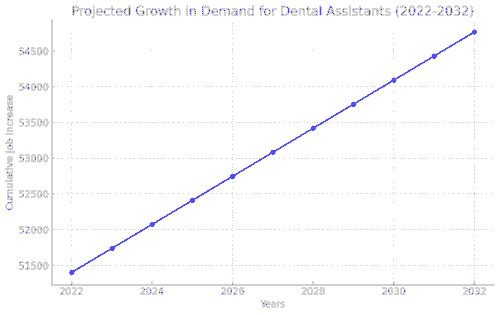If you are considering a career that combines technical skills with the opportunity to contribute positively to people’s health, becoming a dental assistant might be the perfect choice for you. This guide aims to provide aspiring dental assistants with a comprehensive overview of what it takes to thrive in this vital healthcare role.
Why Choose a Career in Dental Assisting?
Dental assistants play a crucial role in dental practices, aiding dentists with procedures, managing patient care, and ensuring the smooth operation of the office. This career not only offers job stability and a rewarding work environment but also opens up numerous opportunities for growth and specialization. Furthermore, as practices increasingly recognize the importance of diversity, equity, and inclusion (DEI), dental assistants with a deep understanding of these values are particularly valued.
This guide will walk you through every aspect of becoming and succeeding as a dental assistant—from the necessary educational background and areas of expertise to the demographic trends and emerging growth opportunities in the field. Get ready to embark on a fulfilling career that promises not just personal growth but also the chance to make a significant impact in the lives of patients.
Educational Requirements for Dental Assistants
Launching a career as a dental assistant involves specific educational prerequisites that must be met before entering the field. These requirements not only ensure that candidates possess the necessary knowledge and skills to perform effectively but also help prepare them for certification and licensure, which may be required depending on the state.
Accredited Dental Assisting Programs
Most states require dental assistants to graduate from an accredited program. These programs, typically offered by community colleges, vocational schools, or dental schools, usually take about one year to complete, resulting in a certificate or diploma. Some schools offer two-year associate’s degree programs for those who wish to advance further. Coursework covers:
- Dental science
- Clinical procedures
- Infection control
- Dental radiography
It’s crucial to ensure the program is accredited by the Commission on Dental Accreditation (CODA), which maintains standards for quality dental education.
Certification and Continuing Education
While not all states require certification, obtaining a credential such as the Certified Dental Assistant (CDA) offered by the Dental Assisting National Board can enhance a dental assistant’s job prospects and potentially lead to higher pay. Certification requirements typically include:
- Graduation from an accredited program
- Passing an exam
- Completing continuing education courses to maintain certification
Continuing education is vital for staying current with dental practices and technologies, and it often includes subjects like infection control, equipment maintenance, and patient care standards. These ongoing education requirements support career longevity and advancement.
Understanding these educational pathways is crucial for anyone interested in pursuing a career in dental assisting. For more guidance on starting your career, check out sterile processing technician jobs.
Areas of Expertise for Dental Assistants
As dental assistants build their careers, they diversify their skill sets across several key areas of expertise. Mastery in these areas not only enhances job performance but also improves employment opportunities in the diverse field of dentistry.
Clinical Skills
Dental assistants are involved in a variety of clinical tasks that require precise skills, including:
- Assisting dentists during procedures by handling instruments and materials
- Taking and processing dental X-rays
- Conducting preliminary dental assessments on patients, such as oral inspection and periodontal charting
- Performing teeth cleanings and fluoride applications under supervision
These clinical responsibilities emphasize the need for a strong foundational knowledge of dental science and patient care techniques.
Administrative Competencies
Beyond clinical duties, dental assistants often take on administrative roles within dental offices. These competencies include:
- Scheduling and confirming appointments
- Handling billing and payment processing
- Maintaining patient records and ensuring compliance with privacy regulations
- Ordering dental supplies and managing inventory
Effective administrative skills contribute to the smooth operation of dental practices, enhancing patient satisfaction and organizational efficiency.
Specialized Dental Technologies
Proficiency in specialized dental technologies is increasingly important for dental assistants. Familiarity with the following technologies can set a dental assistant apart from peers:
- Intraoral cameras and digital radiography
- 3D imaging technology
- Computerized practice management software like Dentrix or Eaglesoft
Understanding these tools enhances a dental assistant’s capability to support complex dental treatments and improves patient care outcomes.
Developing expertise in these areas ensures dental assistants are well-rounded professionals capable of supporting various aspects of dental care. For those looking to delve deeper into healthcare diversity, understanding the broader context of community diversity in healthcare can also provide valuable insights.
Demographics in the United States
The demographic landscape of dental assistants in the United States reflects a diverse workforce. Analyzing these demographics helps us understand how the field varies across different regions and among various populations.
Gender Distribution
The majority of dental assistants are female, making up approximately 92% of the workforce. This gender skew has historical roots in the broader healthcare sector, traditionally seen as a nurturing field eligible for women. However, the percentage of male dental assistants has gradually increased to around 8%. Men are increasingly drawn to the profession due to stable career prospects and growth opportunities.
Age Range
Dental assistants typically range in age from 18 to 45. There are, however, seasoned professionals who have dedicated many years to the field. This age diversity contributes varied expertise and perspectives within dental teams, enhancing collaborative care.
Ethnic Diversity
Ethnic diversity within the dental assistant community mirrors that of the general population, with significant representation from Hispanic, African American, and Asian backgrounds. Efforts to increase diversity are vital for meeting the needs of the local patient population and enriching the workplace culture.
- White: 47.7%
- Hispanic or Latino: 31.6%
- Asian: 9.0%
- Black or African American: 6.1%
- Unknown: 4.9%
- Native American and Alaska Native: 0.7%

Job Satisfaction and Benefits
Despite challenges, many dental assistants find their work rewarding. Surveys indicate that around 60-65% of dental assistants are satisfied with their jobs, with many viewing their roles as careers rather than just jobs. Additionally, the provision of health insurance benefits has increased significantly, which is crucial in showing dental assistants that they are valued members of the dental team.
Understanding these demographic trends helps dental practices tailor their services and create culturally competent care environments. This diversity is vital for meeting the varied needs of the patient population and enriching the workplace culture. For further insights into cultural competency in healthcare, exploring concepts such as global cultural diversity can provide additional perspectives that enhance patient care.
Salary Trends for Dental Assistants
Salary trends for dental assistants provide valuable insights into the economic aspects of this profession. Understanding these trends can help aspiring and current dental assistants gauge the financial benefits of their career choices.
National Average Salary
The average salary for dental assistants in the United States varies widely by region, experience level, and additional skills or certifications. According to the U.S. Bureau of Labor Statistics, the average annual wage for dental assistants is approximately $41,000. However, this figure can fluctuate significantly depending on various factors such as location, years of experience, and specific job responsibilities.
Impact of Location on Salary
Geographic location significantly impacts how much dental assistants earn:
- Highest Paying States: The states that offer the highest average salaries for dental assistants include the District of Columbia, New Hampshire, and Oregon. For instance, dental assistants in the District of Columbia earn an average of $49,740 annually, while those in New Hampshire and Oregon earn around $43,084.
- States with High Employment Levels: States like California, Texas, and Florida have the highest levels of employment for dental assistants. In California, the average annual wage is $52,470; in Texas, it’s $41,690; and in Florida, it stands at $46,240.
This variation highlights the importance of considering location when assessing job offers.
Influence of Experience and Education
Experience and education level are key factors affecting salary:
- Entry-Level Positions: Entry-level dental assistants typically earn lower salaries, which can start at around $30,000 per year. This figure can increase with additional experience, education, and certifications.
- Experienced and Specialized Positions: Dental assistants with significant experience or specialized skills can command higher wages. Those with advanced certifications or who take on additional responsibilities such as office management or specialized dental procedures may earn upwards of $50,000 annually.
Benefits and Job Satisfaction
The provision of benefits and job satisfaction for dental assistants has shown notable improvements in recent years. As of 2024, the percentage of dental assistants receiving health insurance benefits is substantial:
- Health Insurance: Approximately 65.5% of dental assistants now have dental benefits, up from previous years. This increase is seen in both private and corporate dental practices, where 45% of dental assistants in private practices and 80% in corporate practices received health insurance benefits in 2022.
Other Benefits
- Paid Time Off (PTO): Many dental assistants still face challenges with insufficient paid time off, especially in smaller dental offices. Larger practices and corporate settings tend to offer better PTO policies.
- Professional Development: Employers increasingly support continuing education and professional development, which are crucial for career advancement. Many dental assistants receive access to courses, seminars, and sometimes reimbursement for related expenses.
- Retirement Benefits: Retirement benefits, such as 401(k) plans, are more common in larger or more established dental practices. However, not all dental offices offer these benefits, which can be a significant drawback for long-term financial planning.

Investing in further education and gaining experience are proven strategies for increasing earning potential in this field. For those considering job transitions or new roles within the healthcare sector, it is beneficial to explore economic trends comprehensively. Understanding the broader employment landscape can also assist in making informed career decisions.
Hiring Trends for Dental Assistant Jobs
The landscape for dental assistant hiring continues to evolve. Various factors, including technological advancements, demographic changes, and ongoing challenges, influence it.
Employment Trends and Challenges
Dental practices continue to face significant staffing shortages, a trend exacerbated by the pandemic. As of 2024, 75% of dental offices report expecting a talent shortage, making retention of existing staff critical. Practices are increasingly implementing strategies such as “stay interviews” and professional development programs to improve engagement and reduce turnover. Additionally, some practices have started their own dental assisting schools to train and retain new talent directly.
Growth in Demand
The demand for dental assistants remains strong. The U.S. Bureau of Labor Statistics projects employment for dental assistants to grow by 7% from 2022 to 2032, which is faster than the average for all occupations. This growth is driven by the increasing link between oral health and overall health, leading to higher demand for dental services.
Technological Advancements
Technological integration into dental practices is creating new opportunities for dental assistants. Proficiency in digital radiography, scheduling software, and patient management systems is increasingly preferred. Staying current with these technologies is crucial for those entering the field to enhance their employability and effectiveness.
Diversity in the Workplace
There is a growing emphasis on diversity in dental offices to better reflect the varied patient demographics. Practices are seeking dental assistants who can provide culturally competent care to a diverse clientele. Skills in multiple languages and cultural sensitivity are becoming valuable assets for dental assistants, helping practices meet the needs of a broader patient base.
Job Satisfaction and Compensation
Improved salaries, benefits, and a positive working environment are highlighted as key factors in addressing staffing shortages. Dental assistants with advanced certifications and those working in larger or corporate practices tend to receive better compensation and benefits. However, challenges such as insufficient paid time off and limited opportunities for professional development remain concerns for many in the field. For those looking to start or advance in this career, staying informed about these hiring trends and the evolving demands of the profession is crucial.
Education Levels Among Dental Assistants
The educational attainment among dental assistants reflects a diverse range of qualifications driven by state regulations and personal career goals. Here’s a look at the educational pathways in dental assisting:
Basic Certification
Most dental assistants hold at least a basic certification obtained from accredited training programs. These programs typically range from 9 months to 2 years and cover essential topics such as dental anatomy, infection control, and radiography. The National Entry-Level Dental Assistant (NELDA) certification is a popular choice, requiring passing exams in radiation health and safety, infection control, and dental assisting.
Associate Degrees
- Around one-third of dental assistants further their education by pursuing an associate degree. An associate degree can improve prospects for higher-level roles and specialization in areas such as orthodontics or pediatric dentistry.
- This advanced learning provides a deeper understanding of dental sciences and includes both theoretical and practical training, often involving internships or externships.
Continuing Education
Many dental assistants engage in continuing education to stay current with the latest dental practices and technologies. This ongoing education helps:
- Many states require dental assistants to complete continuing education courses to maintain their certifications.
- Enhance skills and knowledge by covering advanced topics like nitrous oxide monitoring, coronal polishing, and digital imaging.
- Employers often support continuing education by offering courses as job benefits, which can open up opportunities for advancement.
Understanding and pursuing these educational paths and certifications is vital for dental assistants aiming to expand their expertise and career opportunities in the dental field.
Skills in Demand for Dental Assistant Jobs
The role of dental assistants is expanding, with certain skills becoming increasingly in demand to meet the requirements of modern dental practices. Here’s a look at the essential skills for dental assistants:
Clinical Skills
Core clinical competencies remain critical for dental assistants. High-demand skills in this area include:
- Basic Supportive Dental Procedures: It is fundamental to perform basic supportive dental procedures under a dentist’s supervision. This includes tasks such as preparing patients for treatments, assisting during procedures, and providing postoperative care.
- Digital Imaging and Electronic Health Records (EHR): Proficiency in using dental software for digital imaging and managing electronic health records is essential. This includes taking and processing X-rays, entering patient data accurately, and maintaining EHR systems.
- Sterilization and Preparation: Skills in preparing and sterilizing dental instruments and operating rooms to ensure a safe and clean environment are vital. This involves understanding infection control protocols and using autoclaves and other sterilization equipment.
Administrative Abilities
Efficient administrative skills complement clinical roles and are increasingly valued:
- Scheduling and Billing: Experience in scheduling patient appointments and managing billing within dental software systems is crucial. This ensures smooth practice operations and enhances patient satisfaction.
- Patient Records Management: The ability to manage patient records accurately and confidentially is important for complying with legal and ethical standards.
- Insurance Claims and Payments: Competence in handling insurance claims and processing payments helps in managing the financial aspects of dental practices efficiently.
Interpersonal and Communication Skills
Since dental assistants interact closely with patients, strong interpersonal and communication skills are essential. These include:
- Empathy and Patience: Dental assistants must exhibit empathy and patience to deal with anxious or fearful patients, providing reassurance and support throughout their visit.
- Clear Communication: Clear communication skills are necessary, especially when explaining procedures, providing post-treatment care instructions, and discussing oral hygiene practices with patients.
- Team Collaboration: The ability to work effectively as part of a dental team is crucial for ensuring smooth workflow and comprehensive patient care. This involves coordinating with dentists, hygienists, and administrative staff.
Developing a well-rounded skill set is crucial for dental assistants aiming to enhance their career prospects and provide high-quality care. For more insights into advancing career skills, check out our guide to enhancing professional skills across occupations. By staying updated with the latest industry trends and continuously improving their skills, dental assistants can better meet the demands of modern dental practices and advance in their careers.
Current & Future Outlook for Dental Assistant Jobs
The outlook for dental assistant jobs remains highly positive, with trends indicating steady growth in employment opportunities over the next decade.
Current Market Conditions
Dental assistant roles are currently in high demand, driven by an increasing focus on preventive dental care and an aging population requiring more dental services. These factors support job security and stability in the field. Dental assistants’ multifaceted role, encompassing direct patient care, infection control, and office administration, makes them indispensable in dental practices.
Future Trends
Looking ahead, several factors contribute to the positive job outlook for dental assistants:
- Growing and Aging Population: As the population grows and ages, the demand for dental services will increase, necessitating more dental assistants to support these services.
- Technological Advancements: Advances in dental technology and treatments will require dental assistants to continuously update their skills. Proficiency in digital radiography, patient management systems, and new dental procedures will be increasingly important.
- Expanding Scope of Dental Services: As dental practices expand their services, such as cosmetic and restorative procedures, the need for skilled dental assistants will grow. This expansion opens up opportunities for specialization in areas like orthodontics, oral surgery, and pediatric dentistry.
Impact of Health Policy Changes
Changes in healthcare policies and increased health insurance coverage significantly shape the demand for dental assistants. As more people gain access to dental care through expanded insurance coverage, the need for skilled dental assistants will continue to rise. This trend emphasizes the importance of ongoing education and training to meet the evolving needs of the healthcare industry.
Understanding this positive job outlook and preparing for future changes is crucial for dental assistants. Staying informed about industry trends and continuing education will help ensure adaptability and continued professional growth.
FAQs on Dental Assistant Careers
What qualifications do I need to become a dental assistant?
To become a dental assistant, you typically need to complete a postsecondary education program accredited by the Commission on Dental Accreditation. Many states also require passing a licensure or certification exam.
How long does it take to become a dental assistant?
Most dental assistant programs can be completed in about one year if you attend full-time. Some schools offer accelerated programs or part-time attendance options that might alter this timeline.
Can dental assistants advance in their careers?
Yes, dental assistants can advance by gaining further certifications, specializing in areas like orthodontics, or pursuing further education to become dental hygienists or dentists.
Is there a demand for dental assistants?
Yes, the demand for dental assistants is expected to grow significantly in the coming years, largely due to the aging population and increased focus on preventive dental care.
What skills are important for dental assistants?
Important skills for dental hands include strong communication, interpersonal skills, attention to detail, and the ability to manage dental and administrative tasks effectively.
Conclusion
Dental assisting offers a dynamic and rewarding career path within the healthcare industry. With the growing demand for dental services, opportunities for dental assistants are set to expand significantly. Investing in the necessary education and developing a range of clinical and administrative skills can open doors to numerous possibilities in this field.
Take the Next Step in Your Career with Diversity Employment
As you consider your future as a dental assistant, remember that continuous learning and adaptation are key to success. Joining a resource-rich platform like ours can provide you with the tools, knowledge, and opportunities to advance your career. Join Diversity Employment and upload your resume today! We support your journey in the healthcare field, offering access to diversity inclusion positions, educational resources, and a community committed to diversity and inclusion. Don’t wait to start or advance your career.





